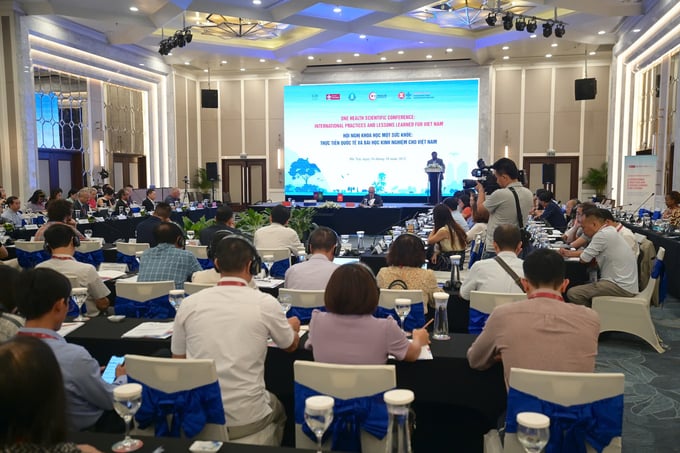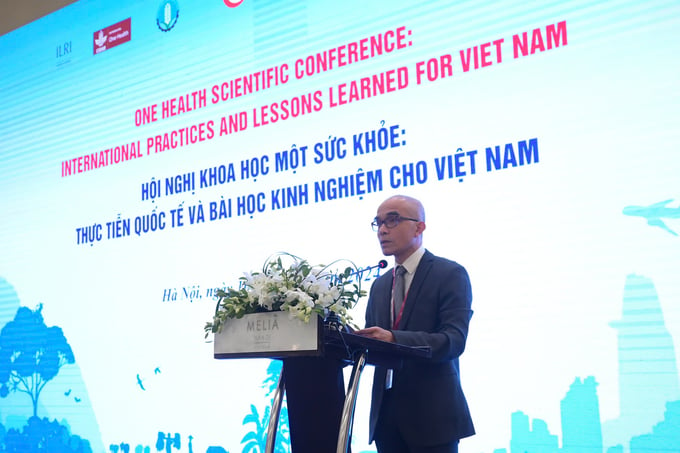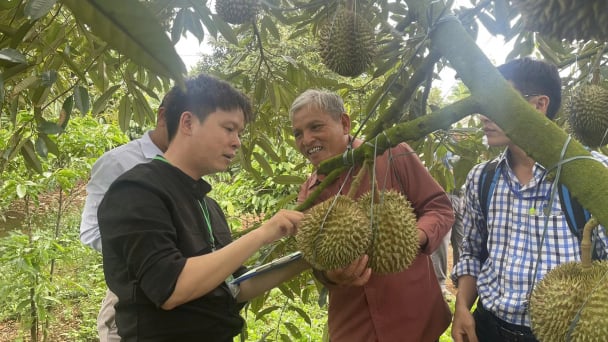May 31, 2025 | 10:18 GMT +7
May 31, 2025 | 10:18 GMT +7
Hotline: 0913.378.918
May 31, 2025 | 10:18 GMT +7
Hotline: 0913.378.918

International One Health Scientific Conference (OHSC) with the theme 'International One Health Practices and Lessons Learned for Vietnam' is held on October 16. Photo: Tung Dinh.
On October 16, the One Health Partnership for Zoonoses (OHP), led by the Ministry of Agriculture and Rural Development (MARD), in collaboration with the International Livestock Research Institute (ILRI), organized the International One Health Scientific Conference (OHSC) with the theme “International One Health Practices and Lessons Learned for Vietnam.”
The event is co-chaired by Professor Appolinaire Djikeng, General Director of ILRI, and Deputy Director of the International Cooperation Department under the Ministry of Agriculture and Rural Development To Viet Chau.
The conference is attended by 100 in-person participants and hundreds of online participants from various provinces and across the globe, creating a vibrant and enthusiastic atmosphere among scientists and applied researchers dedicated to global One Health.
The conference is organized as part of ILRI's 50th anniversary celebration and to mark the International One Health Day (3 November). It will showcase best practices in One Health from Africa, the America, and Asia, with presentations from leading international scientists from 10 countries, as well as representatives from academia, the private sector, and sectors including agriculture, health, and the environment. The conference aims to foster interdisciplinary and regional cooperation.
Vietnam’s One Health Partnership has over 20 years of experience in operating and implementing One Health activities. It originated as the PAHI Partnership (Avian Influenza) in 2003 and was officially renamed as the One Health Partnership for Zoonoses in 2016. Since then, Vietnam has made significant progress in addressing urgent health challenges such as zoonotic diseases, antimicrobial resistance, the illegal wildlife trade, and food safety. Despite being recognized as a global leader in implementing One Health initiatives, there are still gaps in intersectoral and multilateral collaboration, technical capacity, multi-sectoral coordination, and policy enforcement.
The conference will bring together experts from 10 countries, along with representatives from academia, the private sector, and sectors including agriculture, health, and the environment. By promoting interdisciplinary and regional cooperation, it aims to outline a roadmap to improve health and ensure the sustainability of ecosystems in Vietnam and other countries in the Global South. The conference will be an opportunity for stakeholders to discuss and share international experiences and to adapt them to Vietnam’s context. A key solution is to strengthen capacity and interdisciplinary approaches within One Health, particularly the integration of human, animal, and environmental health to enhance resilience against future pandemics.

Deputy Director of the International Cooperation Department under Ministry of Agriculture and Rural Development To Viet Chau delivering a speech at the conferrence. Photo: Tung Dinh.
Delivering the message of MARD's leader to the event, Deputy Director of the International Cooperation Department under Ministry of Agriculture and Rural Development To Viet Chau delivered a speech at the event. Mr. Chau emphasized that Vietnam strives to remain a leader in One Health initiatives through the main coordination of MARD and the strong collaboration of the Ministry of Health and the Ministry of Natural Resources and Environment.
The launch of One Health High-Level Expert Panel, a scientific and strategic advisory group to the Quadripartite organizations – the Food and Agriculture Organization of the United Nations (FAO), the United Nations Environment Programme (UNEP), the World Health Organization (WHO) and the World Organisation for Animal Health (WOAH) – in their collaboration on One Health has highlighted the global commitment for this initiative.
Concurrently, ASEAN leaders' declarations on One Health, with the support from One Health ASEAN network and ASEAN secretariat, shows the determination of Southeast Asia region in general and Vietnam in particular in tackling and overcoming the challenges.
The One Health approach, which emphasizes multi-sectoral coordination and multilateral cooperation, is vital in addressing complex challenges posed by zoonoses, antimicrobial resistance, and food safety. Vietnam’s One Health Partnership seeks to expand cooperation with international communities, especially in high-risk regions such as Africa, and in the Global South.
Therefore, Vietnam’s One Health Partnership calls for broader collaboration with partners from Africa, the Americas, and Europe to implement joint initiatives such as Prezode and the Health Alliance.

Prof Appolinaire Djikeng, Director General of ILRI and Senior Director for Livestock Based-Systems (CGIAR), highlighted the importance of the One Health approach in Vietnam. Photo: Tung Dinh.
In his opening remarks, Prof Appolinaire Djikeng, Director General of ILRI and Senior Director for Livestock Based-Systems (CGIAR), highlighted the importance of the One Health approach in Vietnam: "This conference is not just a response to the challenges we face but an opportunity to transform how we integrate health across human, animal, and environmental sectors. The livestock sector plays a crucial role in addressing and preventing zoonoses, antimicrobial resistance, and food safety issues.
Proper livestock practices, including biosecurity, hygiene, nutrition, and veterinary care, will ensure animal health, environmental health, and human health, directly preventing future pandemics. ILRI is proud to contribute significantly to addressing zoonoses through research and international projects implemented in Vietnam."
National and international speakers from agriculture, health, and environmental fields shared lessons and case studies, aiming to translate global strategies into action at the national level.
Discussions identified gaps and opportunities for effective implementation, offering actionable recommendations to strengthen intersectoral collaboration.
This event is co-sponsored by the CGIAR One Health Initiative (OHI) and the ASEAN - CGIAR Innovate for Food Security and Nutrition Program.
Translated by Linh Linh

(VAN) For the durian industry to succeed, the value chain must fulfill its commitments to the government, the community, and international partners.

(VAN) Vaccinating juvenile pangasius helps reduce disease, antibiotic use, and farming costs, increasing profits for export-oriented farmers in An Giang.

(VAN) Due to a limited supply of workforce and competitive recruitment requirements, businesses struggle to retain talented veterinary human resources.

(VAN) WOAH’s guidance aims to mitigate disease risks through a One Health approach that balances economic, conservation, and public health interests.

(VAN) Ms. Nguyen Thi Dung, Deputy Director of Ngoc Hoang Cooperative, shared about the journey of bringing dragon fruit to Europe, achieving annual revenues in the billions of VND.

(VAN) Bamboo products from Thang Tho Bamboo Cooperative have reached many countries around the world, while also creating jobs for local workers.

(VAN) The Management Board of Con Dao National Park reported that a green sea turtle, tagged in the Philippines, has traveled thousands of kilometers to lay 84 eggs on Bay Canh Islet.